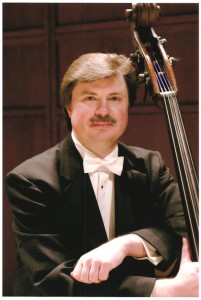
Photo credit: Michael Zirkle
When the complete archive of Senza Sordino was posted on the ICSOM website, I spent hours reading through issue after issue. It is clear just from that source that no person had a greater influence over the gains of orchestral musicians during the past fifty years than Leonard Leibowitz.
I found a 1974 entry from my own orchestra, long before I joined, which said, “We feel the sense of solidarity and pride we have discovered is a direct result of the inspiration of Len Leibowitz.” I’m certain that at one point or another, every orchestra in the country might have been able to make such a statement. Perhaps no single person has ever been a more dedicated influence or a stronger advocate for musicians in the field of symphonic music in America.
He was brilliant, inspiring, legendary, charismatic, witty … and frustrating.
Lenny was a New Yorker through and through. He never re-set his watch from New York time, no matter where he was in the world. I was never with him even one day when he did not complete the New York Times crossword puzzle, always in ink.
He had one of the fastest minds I have ever known, and one of the quickest wits. One time I failed to understand a legal concept he was trying to explain to me, and in apologizing for my follow-up questions I began with, “Please indulge my ignorance, but … ,” and before the sound of my words could taper he interrupted with, “Bruce, I have been indulging your ignorance since I met you.”
He was a legend. It was exciting to be by his side. When he teased you, it made you feel part of an exclusive club. When he complimented you, he made you feel brilliant. He could write amazingly quickly. At one ICSOM conference, we asked for a last minute resolution calling for AFM unity during a time of difficulties between two other groups in the union. Within two minutes he had produced a full resolution on yellow legal paper, beautifully worded, and written in pen without a single crossed out word, like a Mozart score. I went back afterwards to find the torn paper, and I have it right beside me as I am writing this.
During his tenure with ICSOM, he was known simply as “DILC”— Distinguished ICSOM Legal Counsel.
Everyone has their favorite Lenny story. Mine might be the time when we were in New York, on 48th Street around midnight in an April chill. I was staying at a hotel there, and he was trying to get a ride up to 86th Street. It was raining, and the black cars-for-hire were circulating after the Theater crowd had dissipated.
One car pulled up and Lenny said, “86th Street, how much?”
The driver answered, “Fifteen dollars.”
Lenny said, “Ten bucks.” And the driver just moved on. The scene then repeated itself numerous times.
We stood there in the rain for twenty minutes until Lenny got one of those cars to take him home for ten bucks.
For someone who was so constantly generous with his time and himself, he could also be very private. For several years I urged him to write a book about his life, and even tried to help him get started. I told him that he would end up liking the book a lot better if he wrote it than if I did. But he was at times hesitant to review his personal history.
Eventually we got close enough that he would tell me some things about his life. He had a brother who was an artist that died young, and his father had been a photojournalist for the New York Times. His father covered the sports beat and the Yankees, which is where Lenny’s life-long love for the pinstripes began. As a kid he would go to work with his father, and occasionally hang out in the dugout at Yankee Stadium, meeting some of the greatest players in baseball history. His knowledge of baseball was encyclopedic, and in some ways the best place to talk with him was at a baseball game. The last game I saw with him was the Minnesota Twins vs. the Texas Rangers, in August of 2007, and I still have both our tickets stubs (tickets he was somehow able to make me buy of course!)
One night we were going to meet at a restaurant in San Francisco, but he was a little late. He came down and said he had been watching ESPN Classic on the hotel cable system, and they were showing a boxing match from the fifties. In the old film, he saw his father at ringside taking pictures, and he just couldn’t stop watching.
It seems poignant that I find myself writing this on a night when the Yankees were knocked out of the playoffs for this year.
In 2005 I wrote an article about Lenny and a 5:00 a.m. e-mail exchange between the two of us. We were debating economics and the arts, and Lenny wrote one of the most profound appeals for beauty I may have ever read, certainly from a lawyer and not a poet. He wrote:
I wish that there would be no need for the artist to justify governmental and corporate support of great music by arguing its value in financial terms as if it were a commodity, like pig futures, or any other kind of “business.” Wouldn’t the artists be better equipped to demonstrate the intrinsic values of refreshment of the human spirit, the recognition of beauty, and the contribution to nurturing and raising truly civilized and cultured men and women that are the real assets of art? Shouldn’t it be the business leaders, e.g., our own board members, and other interested individuals, corporate and governmental figures, who report on the economic impact of the arts to their business? After all, they are supposed to be the experts, indeed, the “trustees” of the financial health of the community. As the old business slogan goes, “If it’s good for General Motors, it’s good for America.” If that is true, ought it not to be those running “General Motors” to tell us what impact music and other visual and performing arts have made, and continue to make, to the fiscal common good? But instead, in today’s North American Society, it has become the artists themselves who must be the sales personnel of their art form in the context of its economic value rather than the intrinsic value of their passion, their talent, and their ability to take the rest of us down the paths to some of life’s finest moments.
There is not one musician working in an American orchestra today, of any generation, who doesn’t owe a part of his or her livelihood to the work of Lenny Leibowitz. Lenny was ICSOM Counsel until 2010, but the benefits won for musicians by Lenny’s tireless efforts and commitment to the art of music continue. That will remain true for years to come. Of course, there were difficulties too. No man is perfect, and larger than life figures come with flaws. It doesn’t benefit the memory of any man to portray him as a saint. But in my mind and my heart, I remember Lenny tonight at his very best—and his best was more than we had the right to ask of anyone.
Goodbye Lenny. Thank you for everything. I wish I could have seen you just once more.

Leonard Leibowitz
December 15, 1938–October 3, 2011





